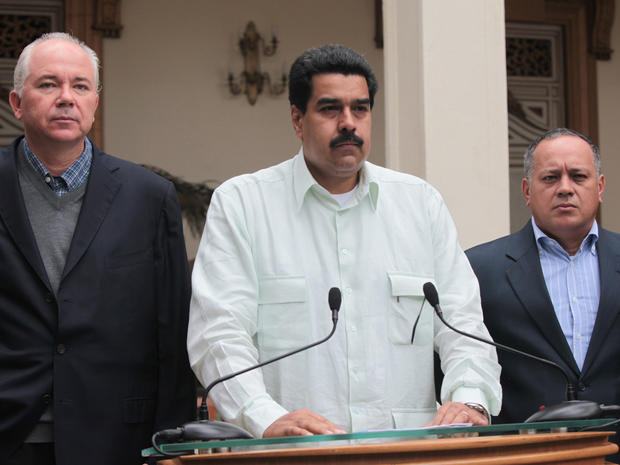Official: Hugo Chavez had complications during surgery
CARACAS, Venezuela President Hugo Chavez suffered bleeding during his cancer surgery in Cuba but was recovering from the complications, Venezuela's government said Thursday.
Chavez suffered "bleeding that required the use of corrective measures" during Tuesday's surgery, Information Minister Ernesto Villegas said, reading a government statement. It said those measures allowed for the "opportune control" of the bleeding.
Villegas also said that Chavez was going through "a progressive and favorable recovery of the normal values of his vital signs."
"This recovery process, nevertheless, will require a prudent period of time as a consequence of the complexity of the surgery performed," he said.
Villegas expressed hope a day earlier about the president returning home for his Jan. 10 swearing-in for a new six-year term, but said in a written message on a government website that if Chavez isn't well enough by then "our people should be prepared to understand it."
Chavez underwent his fourth cancer-related operation in Havana after announcing that tests had found the illness had come back despite previous operations, chemotherapy and radiation treatments. Chavez has kept secret some details about the pelvic cancer, including the type and location of the tumors that have been removed.
Vice President Nicolas Maduro had looked grim on Wednesday when he acknowledged that Chavez faced a "complex and hard" process after his latest surgery.
Amid the bad news, officials have sought to show a united front amid the growing worries about Chavez's health and Venezuela's future. Key leaders of Chavez's party and military officers appeared together on television as Maduro gave updates on Chavez's condition.
"We're more united than ever," said Maduro, who was flanked by National Assembly President Diosdado Cabello and Oil Minister Rafael Ramirez, both key members of Chavez's inner circle. "We're united in loyalty to Chavez."
Analysts say Maduro could eventually face challenges in trying to hold together the president's diverse "Chavismo" movement, which includes groups from radical leftists to moderates, as well as military factions.
Tapped by the 58-year-old president over the weekend as his chosen political heir, Maduro is considered to be a member of radical left wing of Chavez's movement that is closely aligned with Cuba's communist government.
Cabello, a former military officer who also wields power within Chavez's movement, shared the spotlight with Maduro by speaking at a Mass for Chavez's health at a military base.
Just returned from being with Chavez for the operation, Cabello called the president "invincible" but said "that man who is in Havana ... is fighting a battle for his life."
After Chavez's six-hour operation Tuesday, Venezuelan television broadcast religious services where people prayed for Chavez, interspersed with campaign rallies for upcoming gubernatorial elections.
On the streets of Caracas, people on both sides of the country's deep political divide voiced concerns about Chavez's condition and what might happen if he died.
At campaign rallies ahead of Sunday's gubernatorial elections, Chavez's candidates urged Venezuelans to vote for pro-government candidates while they also called for the president to get well.
Many observers said it was likely Chavez's candidates could get a boost from their supporters' outpouring of sympathy for Chavez.
Opposition leader Henrique Capriles, who lost to Chavez in the October presidential election and is running against gubernatorial candidate Elia Jaua, complained Wednesday that his rival and other Chavez allies are taking advantage of the president's health problems to try to rally support.
Maduro looked sad as he spoke on television on Wednesday. "It was a complex, difficult, delicate operation," he said. "The post-operative process is also going to be a complex and hard process."
Without giving details, the vice president reiterated Chavez's recent remarks that the surgery presented risks and that people should be prepared for any "difficult scenarios."
The constitution says presidents should be sworn in before the National Assembly, and if that's not possible then before the Supreme Court.
Former Supreme Court magistrate Roman Duque Corredor said a president cannot delegate the swearing-in to anyone else and cannot take the oath of office outside Venezuela. A president could still be sworn in even if temporarily incapacitated, but would need to be conscious and in Venezuela, Duque told The Associated Press.
If a president-elect is declared incapacitated by lawmakers and is unable to be sworn in, the National Assembly president would temporarily take charge of the government and a new presidential vote must be held within 30 days, Duque said.
Chavez said Saturday that if an election had to be held, Maduro should be elected president.
Chavez has undergone four cancer-related surgeries since June 2011. He has also undergone months of chemotherapy and radiation treatments. Throughout his treatments, Chavez has kept secret some details of his illness, including the exact location and type of the tumors.
Ecuadorean President Rafael Correa wished his close ally the best, while also acknowledging the possibility that cancer might end his presidency. "Chavez is very important for Latin America, but if he can't continue at the head of Venezuela, the processes of change have to continue," Correa said at a news conference in Quito.
